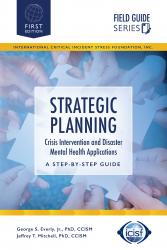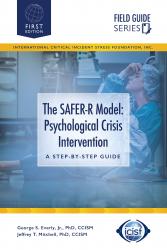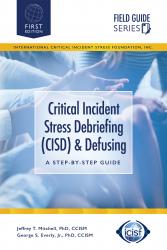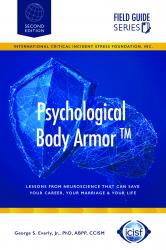Field Guide Series

Purchase our complete Field Guide Series with just one click for a special bundle price!
This bundle contains our four Field Guides "Strategic Planning", "The SAFER-R Model", "CISD & Defusing" and Psychological Body Armor (TM) for a discounted bundle price.
Strategic Planning: This practical Field Guide will help you and your team to develop a strategic plan for organizing various tactical psychological and disaster mental health interventions in the most effective and efficient manner.
The SAFER-R Model: This practical Field Guide introduces the SAFER-R Model of Psychological First Aid (PFA) and is designed for use by emergency services and military peer support, educators, medical and nursing professionals as well as mental health clinicians.
Critical Incident Stress Debriefing (CISD) & Defusing: This practical Field Guide on CISD and Defusing is extremely useful for CISM team members and for anyone who wishes to join staff support programs. It provides protocols and procedures for properly applying these two interactive group crisis intervention tactics.
Psychological Body Armor (TM): This practical Field Guide on Psychological Body Armor™ shows you how to reduce the risk of psychological injury, much the same as physical body armor reduces the risk of physical injury.
Series information
 |
Strategic Planning There are three essential elements in planning: objectives, strategies, and tactics. The strategy is often confused with the objective and the tactic, so this field guide begins by clarifying all three terms and helping you think of strategic planning as the total of all planning processes in support of the objective or goal. Crisis intervention and disaster mental/ behavioral health have been plagued by the vigorous pursuit of tactics, while often ignoring the importance of having a strategic formulation, or framework, within which the tactics may reside. Indeed, the perfectly performed tactical intervention implemented at the wrong time can be as complete a failure as the tactical intervention performed poorly. Thus, while tactical proficiency (how to intervene) is essential, so is the strategic understanding of when and where to implement the chosen interventions to maximize outcome and best achieve the objective.
|
 |
The SAFER-R Model The SAFER-R Model – Psychological Crisis Intervention is designed to provide the reader with a simple set of guidelines for the provision of psychological first aid (PFA). The model of psychological first aid (PFA) for individuals presented in this volume is the SAFER-R model developed by the authors. Arguably it is the most widely used tactical model of crisis intervention in the world with roughly 1 million individuals trained in its operational and derivative guidelines. This model of PFA is not a therapy model nor a substitute for therapy. Rather it is designed to help crisis interventionists stabile and mitigate acute crisis reactions in individuals, as opposed to groups. Guidelines for triage and referrals are also provided. Before plunging into the step-by-step guidelines, a brief history and terminological framework is provided. Lastly, recommendations for addressing specific psychological challenges (suicidal ideation, resistance to seeking professional psychological support, and depression) are provided. |
 |
Critical Incident Stress Debriefing (CISD) & Defusing From fires to floods and from baby deaths to line-of- duty deaths, Critical Incident Stress Management (CISM) teams have been there for their distressed colleagues and friends. Thousands of times, CISM teams were dealing with groups of operations personnel. From a long list of CISM tactics the team members selected two interactive group crisis intervention tactics: Defusing and the Critical Incident Stress Debriefing (CISD). The CISM teams have several primary goals: 1) to reduce stress, 2) to restore people to adaptive function, and 3) to identify anyone who may need additional assistance or a referral for care. This practical FIELD GUIDE on CISD and Defusing will be extremely useful for CISM team members and for anyone who wishes to join staff support programs in all walks of life. It will provide protocols and procedures for properly applying the Defusing and CISD tactics. |
 |
Psychological Body Armor™ Psychological Body Armor™ is a science-based guide to wellness and personal health promotion. The study of psychology and brain-focused sciences can be translated into practical actions one can do to reduce the risk of burnout, vicarious trauma, and moral injury. The goal of this book on Psychological Body Armor™ is to reduce the risk of psychological injury, much the same as physical body armor reduces the risk of physical injury. The study of wellness is the study of how personal health can be promoted and enhanced beyond the mere absence of disease. This book is a guide to the psychology of higher levels of health. |
Purchase our complete Field Guide Series with just one click for a special bundle price!
This bundle contains our four Field Guides "Strategic Planning", "The SAFER-R Model", "CISD & Defusing" and Psychological Body Armor (TM) for a discounted bundle price.
Strategic Planning: This practical Field Guide will help you and your team to develop a strategic plan for organizing various tactical psychological and disaster mental health interventions in the most effective and efficient manner.
The SAFER-R Model: This practical Field Guide introduces the SAFER-R Model of Psychological First Aid (PFA) and is designed for use by emergency services and military peer support, educators, medical and nursing professionals as well as mental health clinicians.
Critical Incident Stress Debriefing (CISD) & Defusing: This practical Field Guide on CISD and Defusing is extremely useful for CISM team members and for anyone who wishes to join staff support programs. It provides protocols and procedures for properly applying these two interactive group crisis intervention tactics.
Psychological Body Armor (TM): This practical Field Guide on Psychological Body Armor™ shows you how to reduce the risk of psychological injury, much the same as physical body armor reduces the risk of physical injury.
| Details | Books | |
|---|---|---|
|
George S. Everly, Jr., PhD, ABPP, CCISM George S. Everly, Jr., PhD, CCISM is an award-winning author and researcher. In 2016, he was ranked #1 published author in the world by PubMed PubReMiner in the field of crisis intervention. He holds appointments as Professor in the Department of International Health (affiliated) at the Johns Hopkins Bloomberg School of Public Health, Associate Professor (part time) in Psychiatry at the Johns Hopkins School of Medicine, and Professor of Psychology at Loyola University in Maryland (core faculty). He is considered one of the founding fathers of the field of disaster mental health. He was a co-founder of the Dept of Psychiatry at Union Memorial Hospital and served on the management committee 12 years. In addition, he has served on the adjunct faculty of the Federal Emergency Management Agency, the FBI’s National Academy at Quantico, Virginia, and ATF’s Peer Support Team. He is an advisor to the Hospital Authority of Hong Kong. Dr. Everly is co-founder of, and serves as a non-governmental representative to the United Nations for, the International Critical Incident Stress Foundation, a non-profit United Nations-affiliated public health and safety organization. He was Senior Advisor on Research in the Office of His Highness the Amir of Kuwait. Prior to these appointments, Dr. Everly was a Harvard Scholar, visiting in psychology, Harvard University; a Visiting Lecturer in Medicine, Harvard Medical School; and Chief Psychologist and Director of Behavioral Medicine for the Johns Hopkins Homewood Hospital Center. |
Critical Incident Stress Debriefing (CISD) & Defusing, Critical Incident Stress Management (CISM): A Practical Review, Strategic Planning, The Resilient Child, The SAFER-R Model, The Secrets of Resilient Leadership, Psychological Body Armor™, Assisting Individuals in Crisis, Critical Incident Stress Management (CISM) & Psychological Crisis Intervention, 1. Rest-Information-Transition-Services , 2. Crisis Management Briefing, 3. Defusing, 4. Critical Incident Stress Debriefing, CISM Demonstration Video Bundle | |
|
Jeffrey T. Mitchell, PhD, CCISM Jeffrey T. Mitchell, PhD, CCISM is Clinical Professor of Emergency Health Services at the University of Maryland in Baltimore County, Maryland. He is a member of the Graduate Faculty of the University of Maryland. He is a co-founder and President Emeritus of the International Critical Incident Stress Foundation. He earned his Ph.D. in Human Development from the University of Maryland. He served for six years as a regional coordinator of Emergency Medical Services for the Maryland Institute for Emergency Medical Services Systems. He was responsible for the development of the Emergency Medical Services System in five southern Maryland counties. After serving as volunteer paramedic / firefighter for ten years, he developed a comprehensive, integrated, systematic, and multi-component crisis intervention program called “Critical Incident Stress Management.” Today, that program reduces traumatic stress in many countries. He has authored more than 275 articles and 19 books in the stress and crisis intervention fields. He serves as an adjunct faculty member of the Emergency Management Institute of the Federal Emergency Management Agency. He is a faculty member of Florida Institute of Technology and teaches a course on the psychology of disasters. Dr. Mitchell is a faculty member in the school of education, Johns Hopkins University. He is a reviewer for the Journal of the American Medical Association (JAMA), Disaster Medicine, the Journal of Emergency Medical Services (JEMS) and the International Journal of Emergency Mental Health. He received the Austrian Red Cross Bronze Medal for his work in Crisis Intervention in the aftermath of the Kaprum, Austria train tunnel fire. The Association of Traumatic Stress Specialists approved Dr. Mitchell as a Certified Trauma Specialist. The United Nations appointed him to the United Nations Department of Safety and Security Working Group on Stress. He has consulted on stress, crisis, and trauma topics in 28 nations and in every one of the 50 United States. |
Critical Incident Stress Management (CISM): A Practical Review, Strategic Planning, The SAFER-R Model, Critical Incident Stress Debriefing (CISD) & Defusing, Group Crisis Intervention, Advanced Group Crisis Intervention, 1. Rest-Information-Transition-Services , 2. Crisis Management Briefing, 3. Defusing, 4. Critical Incident Stress Debriefing, CISM Demonstration Video Bundle, Disasters |
